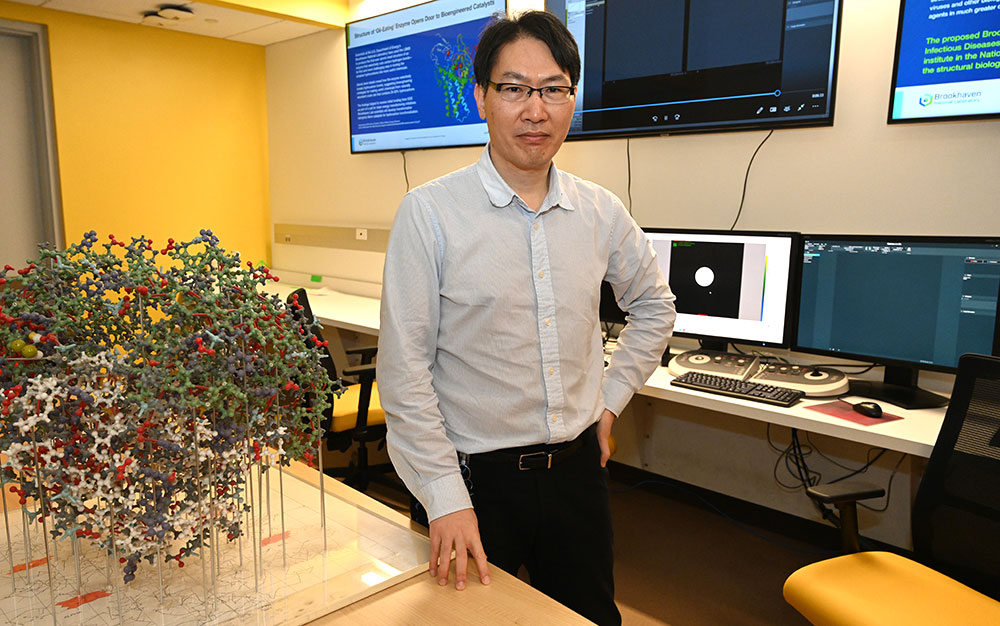Department of Energy Announces $112.4 Million for Research to Support National Biopreparedness and Response
Projects utilize unique capabilities and facilities of the national laboratories to address future biological crises
September 7, 2023
 enlarge
enlarge
Qun Liu, a structural biologist at Brookhaven National Laboratory, will lead a research project to analyze atomic-scale structural details of how plant pathogens interact with bioenergy crops to cause infection and disease.
The following news release announcing funding for 10 research projects to support biopreparedness and response capabilities was issued by the U.S. Department of Energy (DOE). Qun Liu, a structural biologist at the U.S. Department of Energy’s Brookhaven National Laboratory, will lead a project titled “Unlocking the molecular basis of plant-pathogen interactions to create resilient bioenergy crops.” The research will use DOE Office of Science user facilities, including Brookhaven’s National Synchrotron Light Source II (NSLS-II) and the Laboratory for BioMolecular Structure (LBMS), to analyze how plant pathogens interact with bioenergy crops to cause infection and disease with the goal of designing strategies to prevent or respond to these infections and diseases. The project builds on a pilot study previously funded by DOE and described in this news release. The team includes partners from Pacific Northwest National Laboratory, Lawrence Berkeley National Laboratory, Argonne National Laboratory, the University of Illinois Urbana-Champaign, Texas A&M University, and the University of North Carolina, Chapel Hill. For more information about Brookhaven Lab’s role in this research, contact: Karen McNulty Walsh, kmcnulty@bnl.gov, (631) 344-8350.
WASHINGTON, D.C. - Today, the U.S. Department of Energy (DOE) announced $112.4 million in funding for 10 research projects for the Biopreparedness Research Virtual Environment (BRaVE) initiative. These projects will support national biopreparedness and response capabilities that can be advanced with DOE’s distinctive capabilities.
The 2023 BRaVE awards focus on five research areas that take advantage of DOE’s distinctive capabilities and facilities in physical, computational, and biological sciences. The research focuses on understanding pathogen interactions that can lead to new approaches for both disease detection and design of targeted therapies, developing more complete models of how epidemics spread, designing novel anti-pathogen materials, and providing innovations in DOE’s user facility instrumentation, experimental techniques, and data analytics that will support biopreparedness and response.
“The advances made in this program will revolutionize our understanding of the science underlying a range of potential biological events and transform the nation’s ability to prepare for, and respond to, future biological threats,” said Asmeret Asefaw Berhe, Director of the DOE’s Office of Science. “Further, these advances will complement research efforts associated with other federal agencies and will be broadly applicable to understanding plant pathogens of crops that are central to DOE’s bioenergy program, as well as other biological systems.”
BRaVE builds on the success of DOE’s National Virtual Biotechnology Laboratory (NVBL) that contributed to the fight against COVID-19. During the pandemic, DOE research helped to understand the spread of the virus, delivered manufacturing solutions to stem the shortages of supplies, developed new virus testing protocols, and identified potential candidates for antiviral drugs. DOE also opened its user facilities for research on the virus’s structure and data from these facilities supported the development of all three FDA-approved vaccines, as well as antiviral drugs and antibodies.
The projects were selected by competitive peer review under the DOE National Laboratory Program Announcement for FY 2023 Biopreparedness Research Virtual Environment (BRaVE). The multi-disciplinary projects are supported by the Office of Science programs in Advanced Scientific Computing Research, Basic Energy Sciences, and Biological and Environmental Research. The projects include multi-institutional teams, led by individual national laboratories with partners from other national laboratories and universities, including Historically Black Colleges and Universities (HBCUs) and Minority Serving Institutions (MSIs).
Total funding is $112.4 million for projects lasting up to three years in duration, with $37.5 million in Fiscal Year 2023 dollars and outyear funding contingent on congressional appropriations. The list of projects and more information can be found on the Biopreparedness Research Virtual Environment (BRaVE) initiative homepage.
Selection for award negotiations is not a commitment by DOE to issue an award or provide funding. Before funding is issued, DOE and the applicants will undergo a negotiation process, and DOE may cancel negotiations and rescind the selection for any reason during that time.
2023-21435 | INT/EXT | Newsroom









